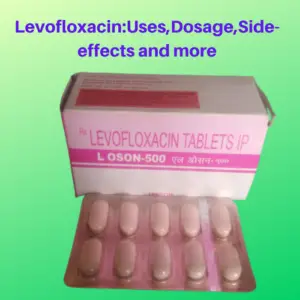- Levofloxacin is used to treat certain infections such as pneumonia, and kidney, prostate, and skin infections. Levofloxacin is used only used for bacterial infections that cannot be treated with safer antibiotics. This is because levofloxacin is a fluoroquinolone antibiotic and fluoroquinolone antibiotics can cause serious or disabling side-effects.
- Levofloxacin may cause side effects. Tell your doctor if any of these symptoms are severe
- vomiting.
- diarrhea.
- stomach pain.
- constipation.
- heartburn.
- vaginal itching.
- Levofloxacin is used to treat certain infections such as pneumonia, and kidney, prostate, and skin infections. Levofloxacin is used only used for bacterial infections that cannot be treated with safer antibiotics. This is because levofloxacin is a fluoroquinolone antibiotic and fluoroquinolone antibiotics can cause serious or disabling side-effects.
1. what is a Levofloxacin?
- Levofloxacin is a synthetic antibacterial agent of the fluoroquinolone class and is the S(-)enantiomer of the racemic drug substance ofloxacin.

- also read:Levofloxacin in hindi
2.Indication of levofloxacin.
- Acute sinusitis,acute exacerbation of chronic bronchitis, community-acquired pneumonia, complicated urinary tract infection including pyelonephritis, skin and soft tissue infection.
3.Dosage of levofloxacin:
- Once or twice maximum duration of treatment of 14 days.
4. Contra-indication of levofloxacin:
- Hypersensitivity.
- Epilepsy.
- History of tendon disorders.
- In children or growing adolescents.
5. Special precaution of levofloxacin:
- Clostridium difficile-associated diseases.
- Tendinitis.
- Patients predisposed to seizures.
- Patients with renal impairment.
- Prevention of photosensitization.
6. Drug interactions of levofloxacin:
- Iron salts, aluminium or magnesium-containing antacids, sucralfate, theophylline, fenbufen, or similar non-steroidal anti-inflammatory drugs.
7.storage of levofloxacin:
- Keep all medicines out of the reach and sight of children.
- Store in a cool, dry place, away from direct heat and light.
8.Frequently Asked Questions about levofloxacin:
Q-1.Which disease is cured by levofloxacin?
A-1. Levofloxacin is used to treat a variety of bacterial infections. This drug belongs to a class of drugs called quinolone antibiotics. It works by stopping the growth of bacteria.
Q-2. Why is Levoflox 500 used?
A-2. Levoflox 500 Tablet is an antibiotic medicine. It is used to treat bacterial infections of the lungs, throat, tubes, nose, ears, urinary tract, skin and soft tissues. You should always complete the full course of treatment with antibiotics prescribed by your doctor.
Q-3. How dangerous is levofloxacin?
A-3. levofloxacin can damage your body’s main blood artery, the aorta. This can cause dangerous bleeding or death. Get emergency medical help if you have severe and persistent pain in your chest, abdomen, or back.
Q-4. What foods should be avoided while taking levofloxacin?
A-4. Do not take this medication with milk, yogurt, or other dairy products or juices that contain calcium. If you take antacids, mineral supplements, or vitamins that contain minerals (see page 3 for examples), take levofloxacin at least 2 hours before or 4 hours after these medications.
Q-5. Can levofloxacin cause kidney damage?
A-5. Levofloxacin is a commonly used antibiotic that can very rarely cause crystal nephropathy. Crystal-induced AKI most commonly occurs as a result of acute uric acid nephropathy and after administration of drugs or toxins that are poorly soluble or whose metabolites are poorly soluble in urine.
Q-6. What types of bacteria does levofloxacin treat?
A-6. Levofloxacin is a fluoroquinolone antibacterial agent with a broad spectrum of activity against gram-positive and gram-negative bacteria and uncommon respiratory pathogens. It is active against both penicillin-sensitive and penicillin-resistant Streptococcus pneumoniae.
Q-7. Does Levofloxacin make you urinate a lot?
A-7. Levofloxacin may rarely cause serious changes in blood sugar, particularly if you have diabetes. Watch for symptoms of high blood sugar such as increased thirst/urination.
Q-8. What vitamins should not be taken with levofloxacin?
A-8. Products containing magnesium, aluminum, calcium, iron, and/or other minerals may interfere with the absorption of levofloxacin into the bloodstream and reduce its effectiveness. If possible, it may be best to avoid taking multivitamins with minerals during treatment with levofloxacin.
Q-9. What food can I eat while taking levofloxacin?
A-9. You can take levofloxacin tablets with food or on an empty stomach. It is best to take this medication with a full glass (8 ounces) of water. Drink several extra glasses of water every day unless otherwise directed by your doctor. Drinking extra water will help prevent some unwanted effects of levofloxacin.
Q-10. When to take Levofloxacin 500 mg tablet?
A-10. Levofloxacin Oral Liquid should be taken 1 hour before or 2 hours after meals. Measure your dose with a marked measuring spoon, oral syringe, or medicine cup. You can take levofloxacin tablets with food or on an empty stomach. It is best to take this medication with a full glass (8 ounces) of water.
9.Conclusion:
In conclusion, Levofloxacin is a powerful antibiotic commonly used to treat various bacterial infections. It is important to follow the prescribed dosage and duration to avoid potential side effects. If you experience any severe side effects, contact your healthcare provider immediately. Levofloxacin can be an effective treatment option when used correctly and under medical supervision.
Disclaimer – The above information is to the best of our research and knowledge. But, you are advised to consult a physician before consuming the medicine.
